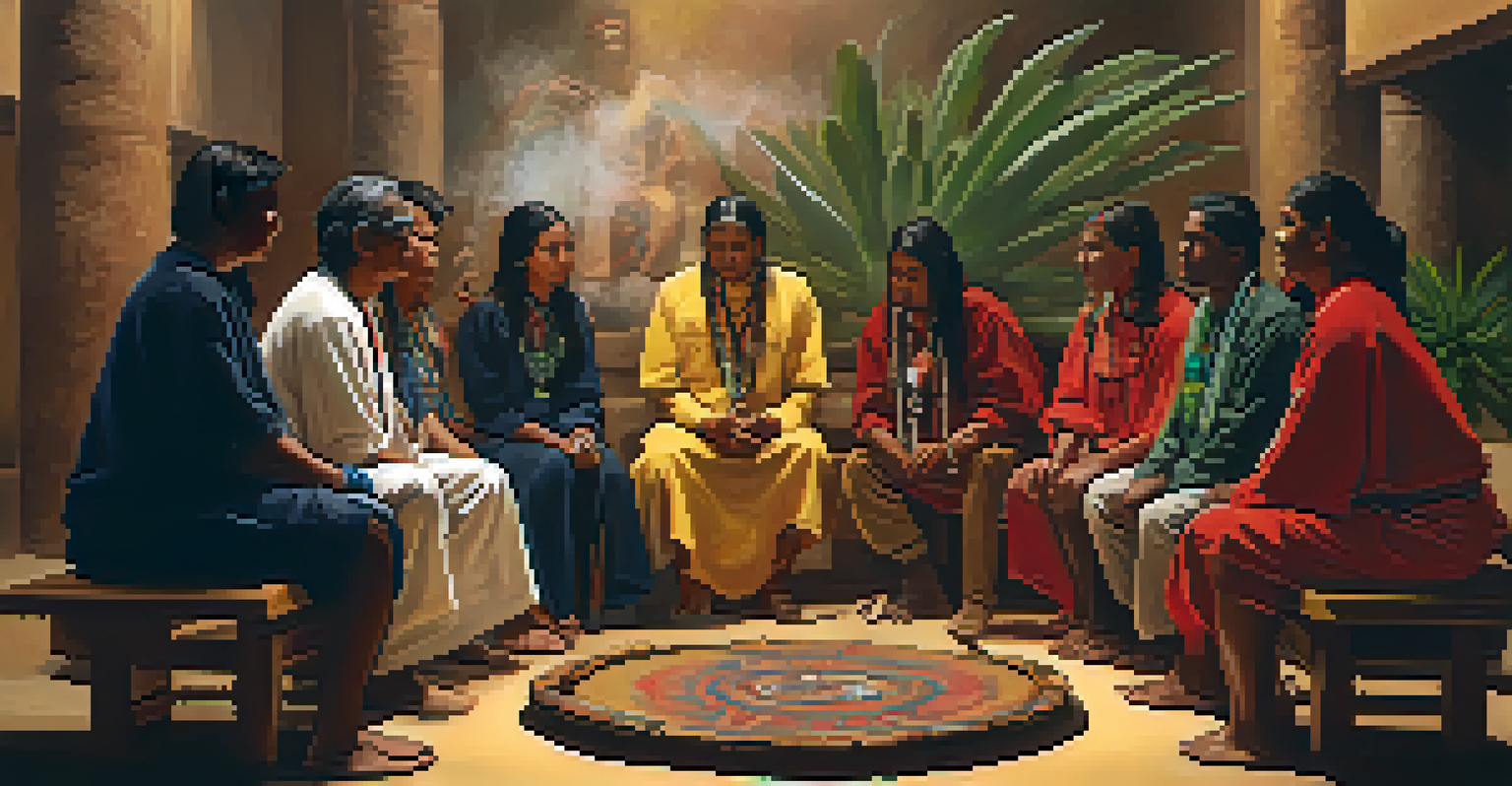The Role of Advocacy Groups in Peyote Legal Reforms Today

Understanding Peyote and Its Cultural Significance
Peyote is a small cactus native to Mexico and the southwestern United States, known for its psychoactive properties. For centuries, it has been used in spiritual and religious ceremonies by Indigenous peoples. The cultural significance of Peyote is profound, symbolizing a connection to the earth and providing a means for community healing and personal insight.
The use of Peyote is not simply about the substance itself, but about the connection to the cultural identity and spiritual practices of Indigenous peoples.
Despite its importance to Indigenous cultures, Peyote has faced legal challenges that restrict its use. The prohibition stems from broader drug laws that often overlook cultural contexts. This creates a complex landscape where the rights of Indigenous peoples clash with contemporary legal frameworks.
Recently, there has been a growing recognition of the need to respect these cultural practices. Advocacy groups are stepping in to highlight the importance of Peyote in Indigenous spirituality, pushing for reform that acknowledges these traditions and their place in modern society.
The Emergence of Advocacy Groups for Peyote Rights
Advocacy groups have emerged as powerful voices in the movement for Peyote legal reforms. Organizations such as the Native American Church and various grassroots collectives are leading the charge. These groups work tirelessly to educate the public and lawmakers about the cultural significance of Peyote, striving to change perceptions and policies.

Through rallies, educational campaigns, and community engagement, advocacy groups are fostering a deeper understanding of the issues at hand. They highlight stories of individuals and communities who rely on Peyote for spiritual and healing practices. This personal touch makes the cause relatable and urgent, garnering broader support.
Cultural Significance of Peyote
Peyote holds deep spiritual and cultural importance for Indigenous peoples, serving as a means for community healing and personal insight.
Moreover, these organizations often collaborate with legal experts to navigate the complex legislative landscape. By combining cultural advocacy with legal strategy, they are effectively positioning themselves as key stakeholders in the ongoing discussions about Peyote reform.
Legal Challenges Facing Peyote Use Today
Despite the efforts of advocacy groups, legal challenges continue to plague Peyote use. Federal laws, particularly the Controlled Substances Act, categorize Peyote as a Schedule I substance, making its use largely illegal outside of specific exemptions. This creates a disconnect between cultural practices and legal recognition.
Advocacy is about transforming public perception and policy to reflect the true significance of cultural practices.
Many Indigenous people face legal repercussions for using Peyote in traditional ceremonies, leading to a sense of injustice and frustration. The conflict between cultural rights and drug enforcement policies is a critical issue that advocacy groups aim to address. They are pushing for legal reforms that will protect these sacred practices.
The ongoing legal battles highlight the need for a more nuanced approach to drug policy—one that considers cultural and spiritual dimensions. Advocacy groups are calling for legislative changes that reflect the unique status of Peyote within Indigenous cultures.
The Role of Public Awareness in Legal Reforms
Public awareness plays a vital role in driving legal reforms for Peyote use. Advocacy groups utilize social media, public speaking engagements, and educational programs to spread awareness about the cultural significance of Peyote. By informing the broader community, they help foster empathy and understanding.
Campaigns that showcase the personal stories of Indigenous users are particularly impactful. When people hear about the healing and spiritual benefits of Peyote directly from those who use it, it shifts the narrative from a purely legal issue to a matter of human rights. This emotional connection can be a catalyst for change.
Advocacy for Legal Reforms
Advocacy groups are actively working to change perceptions and push for legal reforms that respect the cultural practices surrounding Peyote.
Moreover, as public interest grows, policymakers may feel pressured to reconsider existing laws. Advocacy groups are tapping into this potential, encouraging supporters to advocate for change at local and national levels, creating a ripple effect that can lead to meaningful reform.
Collaborative Efforts Between Advocacy Groups and Lawmakers
Collaboration between advocacy groups and lawmakers is crucial in the fight for Peyote legal reforms. By working together, these entities can create policies that honor both cultural practices and public safety. Advocacy groups often provide lawmakers with essential information about the importance of Peyote, shaping informed policy decisions.
Many advocacy organizations have developed relationships with sympathetic lawmakers who understand the cultural significance of Peyote. These partnerships can lead to the introduction of bills that aim to protect Indigenous rights and promote the responsible use of Peyote. Such alliances are essential for creating sustainable change.
Additionally, advocacy groups often participate in legislative hearings, providing testimony and expert opinions. This direct engagement allows them to influence the dialogue around Peyote use and ensure that Indigenous voices are heard in policy discussions.
The Future of Peyote and Advocacy Efforts
The future of Peyote use and advocacy efforts looks promising, though challenges remain. As more people become aware of the cultural and spiritual significance of Peyote, there is potential for broader support for legal reforms. Advocacy groups are optimistic that continued education will lead to changes in public perception and policy.
Additionally, the increasing interest in plant-based medicines and holistic healing practices may further bolster the cause. As society shifts towards more inclusive views on spirituality and wellness, Peyote could be re-evaluated in a more favorable light. Advocacy groups are poised to harness this momentum to push for meaningful change.
Challenges in Legal Recognition
Despite advocacy efforts, Peyote remains classified as a Schedule I substance, creating legal obstacles for its use in traditional ceremonies.
Ultimately, the goal is to create a legal environment that respects and protects Indigenous practices while allowing for responsible use of Peyote. Advocacy groups will continue to play a pivotal role in this journey, ensuring that the voices of Indigenous peoples are not only heard but also honored in the legal reform process.
Conclusion: The Impact of Advocacy on Peyote Reforms
In conclusion, advocacy groups are at the forefront of the movement for Peyote legal reforms. Their efforts to raise awareness, educate the public, and collaborate with lawmakers have the potential to create lasting change. By highlighting the cultural significance of Peyote, these groups are not only fighting for legal rights but also for the preservation of Indigenous traditions.
As society becomes more open to conversations about spirituality and cultural heritage, the role of advocacy groups will only grow. The journey towards reform is ongoing, but the commitment of these organizations is unwavering. They provide hope for a future where Peyote is recognized and respected as a vital part of Indigenous culture.

Ultimately, the impact of advocacy on Peyote reforms extends beyond legal changes; it represents a broader movement towards understanding, respect, and justice for Indigenous peoples. In this light, the work of advocacy groups is not just about legal reform—it's about healing and reconciliation.